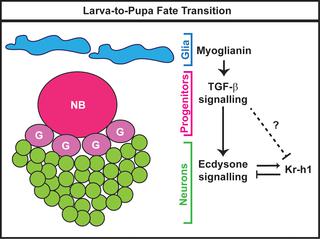当前位置:
X-MOL 学术
›
PLOS Genet.
›
论文详情
Our official English website, www.x-mol.net, welcomes your
feedback! (Note: you will need to create a separate account there.)
Modulators of hormonal response regulate temporal fate specification in the Drosophila brain.
PLOS Genetics ( IF 4.0 ) Pub Date : 2019-12-06 , DOI: 10.1371/journal.pgen.1008491 Giovanni Marchetti 1 , Gaia Tavosanis 1, 2
PLOS Genetics ( IF 4.0 ) Pub Date : 2019-12-06 , DOI: 10.1371/journal.pgen.1008491 Giovanni Marchetti 1 , Gaia Tavosanis 1, 2
Affiliation

|
Neuronal diversity is at the core of the complex processing operated by the nervous system supporting fundamental functions such as sensory perception, motor control or memory formation. A small number of progenitors guarantee the production of this neuronal diversity, with each progenitor giving origin to different neuronal types over time. How a progenitor sequentially produces neurons of different fates and the impact of extrinsic signals conveying information about developmental progress or environmental conditions on this process represent key, but elusive questions. Each of the four progenitors of the Drosophila mushroom body (MB) sequentially gives rise to the MB neuron subtypes. The temporal fate determination pattern of MB neurons can be influenced by extrinsic cues, conveyed by the steroid hormone ecdysone. Here, we show that the activation of Transforming Growth Factor-β (TGF-β) signalling via glial-derived Myoglianin regulates the fate transition between the early-born α'β' and the pioneer αβ MB neurons by promoting the expression of the ecdysone receptor B1 isoform (EcR-B1). While TGF-β signalling is required in MB neuronal progenitors to promote the expression of EcR-B1, ecdysone signalling acts postmitotically to consolidate theα'β' MB fate. Indeed, we propose that if these signalling cascades are impaired α'β' neurons lose their fate and convert to pioneer αβ. Conversely, an intrinsic signal conducted by the zinc finger transcription factor Krüppel-homolog 1 (Kr-h1) antagonises TGF-β signalling and acts as negative regulator of the response mediated by ecdysone in promoting α'β' MB neuron fate consolidation. Taken together, the consolidation of α'β' MB neuron fate requires the response of progenitors to local signalling to enable postmitotic neurons to sense a systemic signal.
中文翻译:

激素反应的调节剂调节果蝇大脑中的时间命运规范。
神经元多样性是由神经系统支持的基本功能(如感觉感知,运动控制或记忆形成)所进行的复杂过程的核心。少数祖细胞可保证这种神经元多样性的产生,随着时间的流逝,每个祖细胞都起源于不同的神经元类型。祖细胞如何依次产生不同命运的神经元,以及外来信号传递有关发育过程或环境条件的信息对这一过程的影响,这是一个关键但难以捉摸的问题。果蝇蘑菇体(MB)的四个祖先依次产生MB神经元亚型。MB神经元的暂时命运决定模式可能受到类固醇激素蜕皮激素所传达的外在线索的影响。这里,我们表明,通过胶质细胞来源的肌红蛋白对转化生长因子-β(TGF-β)信号的激活通过促进蜕皮激素受体B1的表达来调节早产α'β'和先驱αβMB神经元之间的命运转变。异构体(EcR-B1)。MB神经元祖细胞需要TGF-β信号传导来促进EcR-B1的表达,蜕皮激素信号传导在有丝分裂后起作用,以巩固α'β'MB的命运。的确,我们提出如果这些信号级联受损,则α'β'神经元将失去命运并转化为先驱者αβ。相反,锌指转录因子Krüppel-homolog1(Kr-h1)传导的内在信号拮抗TGF-β信号,并充当蜕皮激素介导的反应的负调节剂,促进α'β'MB神经元命运的巩固。
更新日期:2019-12-07
中文翻译:

激素反应的调节剂调节果蝇大脑中的时间命运规范。
神经元多样性是由神经系统支持的基本功能(如感觉感知,运动控制或记忆形成)所进行的复杂过程的核心。少数祖细胞可保证这种神经元多样性的产生,随着时间的流逝,每个祖细胞都起源于不同的神经元类型。祖细胞如何依次产生不同命运的神经元,以及外来信号传递有关发育过程或环境条件的信息对这一过程的影响,这是一个关键但难以捉摸的问题。果蝇蘑菇体(MB)的四个祖先依次产生MB神经元亚型。MB神经元的暂时命运决定模式可能受到类固醇激素蜕皮激素所传达的外在线索的影响。这里,我们表明,通过胶质细胞来源的肌红蛋白对转化生长因子-β(TGF-β)信号的激活通过促进蜕皮激素受体B1的表达来调节早产α'β'和先驱αβMB神经元之间的命运转变。异构体(EcR-B1)。MB神经元祖细胞需要TGF-β信号传导来促进EcR-B1的表达,蜕皮激素信号传导在有丝分裂后起作用,以巩固α'β'MB的命运。的确,我们提出如果这些信号级联受损,则α'β'神经元将失去命运并转化为先驱者αβ。相反,锌指转录因子Krüppel-homolog1(Kr-h1)传导的内在信号拮抗TGF-β信号,并充当蜕皮激素介导的反应的负调节剂,促进α'β'MB神经元命运的巩固。











































 京公网安备 11010802027423号
京公网安备 11010802027423号